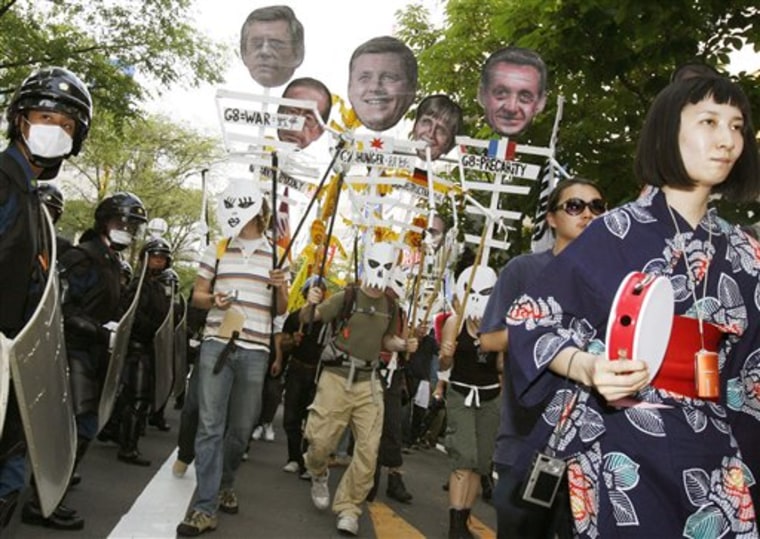Battling maternal mortality, demanding clean water and urging the destruction of capitalism might not seem to have much in common — unless you're at a summit of the world's top industrialized nations.
The Group of Eight annual meetings draw a hodgepodge of activists and causes from around the world, all in hopes of some media exposure and possibly some action by the world's richest and most powerful countries.
This year's gathering in Toyako, northern Japan, is no exception. The list of demands activists are making on summiteers is seemingly endless: ban cluster bombs, stop global warming, end poverty, outlaw war — even abolish themselves.
"No to the hypocritical G8 Summit promoting the destruction of the global environment!" blared one lengthy banner at a protest Saturday in Sapporo, about 65 miles northeast of the summit venue.
It's no wonder activists focus on the G-8.
This year's summit is being attended by 22 leaders, which the Japanese hosts say is the largest ever. The core member countries — the United States, Japan, Germany, France, Britain, Italy, Canada and Russia — account for nearly 60 percent of the world economy.
The world will be watching. Some 5,000 journalists have been accredited to attend, though the bulk of them will be cloistered far from the venue, in the resort town of Rusutsu, nearly 20 miles from Toyako.
The grab-bag of causes represented at the summit has expanded as the number of nonmember nations invited — such as African countries and up-and-coming economic powers like China — has increased, bringing a widening circle of concerns to the table.
Appealing to the most powerful
The main attraction, however, remains the chance for activists to make an appeal directly to the most powerful.
"They're all people who for one reason or another are dissatisfied with the status quo," said Phil Thornhill, a global warming activist marching in Sapporo. He carried a "Wanted" sign with President Bush's face on it, above the slogan: "For Crimes Against the Planet."
There's plenty of dissatisfaction with the status quo at summit protests.
Saturday's action started with a pro-family farmer organization called La Via Campesina, which decried subsidies and other supports in rich countries for big-business agriculture and demanded a return to small-scale farming to restore stability to food prices and supplies.
The farmers — mostly elderly Japanese fanning themselves in a Sapporo park — were followed by protesters focused on a wide array of issues: genetically modified food, debt forgiveness for poor nations, nuclear weapons and nuclear power, pacifism, anarchism, climate change.
A central theme running through a lot of the complaints was that the richest nations, by furthering globalization, have triggered a series of crises — in the world economy, in oil prices, in agriculture, and in the climate.
"These intersecting crises have come together to unravel the project of corporate-driven globalization," said Walden Bello, of the Focus on the Global South. "We don't believe in the G-8. These are not the leaders of the world."
Summit activism also involves a fair amount of street theater.
Hiroki Sawakawa, a nursing home worker in Sapporo, came to a protest to demand world peace — and made the point by dressing as an angel, with white robes, wings and a tinfoil halo above his head. He was joined by co-workers who held up letters spelling P-E-A-C-E.
"I want them (the G-8) to create a stable, safe life for everyone," he said. "I'm not an activist, but I've always thought this way."
